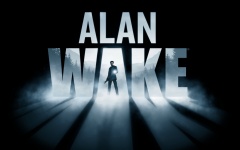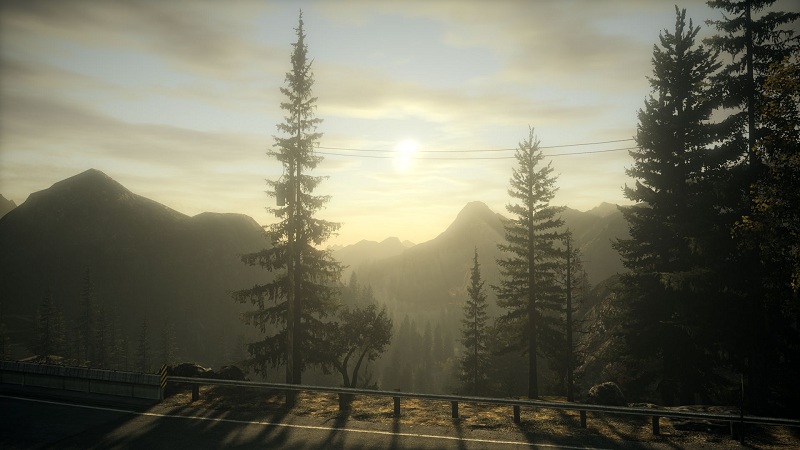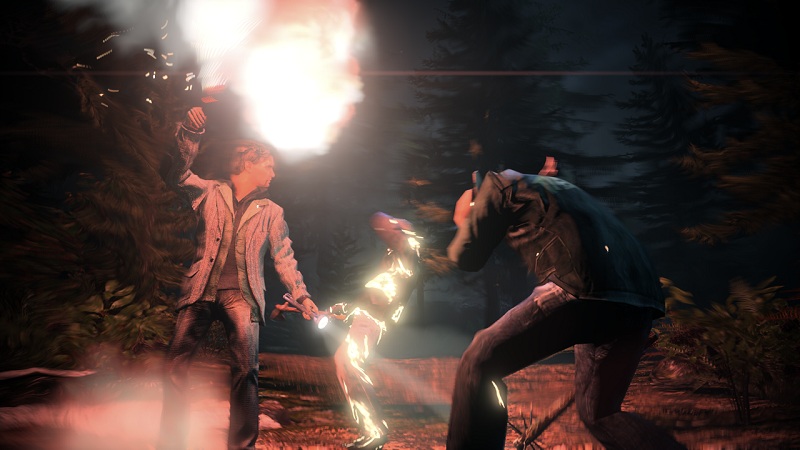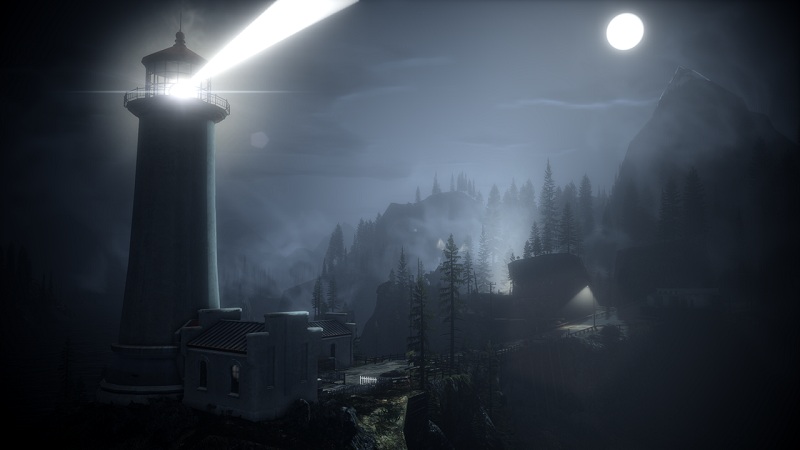Alan Wake
| Alan Wake | |
|---|---|
 |
|
| Platforms | Xbox 360 |
| Genre | Shadowy Psychological Action Horror |
| Score | 8  |
Alan Wake has been a long time coming. After Max Payne 2 released in 2003, Remedy has used the majority of their resources for this game. Originally announced in 2005, it has naturally undergone significant revisions. Once a freeroaming affair, Alan Wake is now almost entirely linear. Instead of releasing on consoles and PC, Remedy ended up partnering with Microsoft for an exclusive 360 release. As one would expect from a partnership, the game got bigger and bigger and eventually ended up being a high-profile, big-budget release when it finally hit in May 2010. Such a big game for a small company would carry with it many risks and increasingly impatient onlookers. Is the survival-horror tale worth the wait in the end? Is the Alan Wake concept still relevant and contemporary enough several years later? Most importantly, is the game good and does it work? Let's take a dive into the darkness...
The first thing you'll notice is that Alan Wake indeed feels very polished. From cutscenes to adventure gameplay to battles, the visuals, sound and directing are consistantly at a very high quality. Indeed, this game contains some of the most impressive visuals I've seen on console. The time-lapse effects, dancing dark forests, constant attention to lighting and swooping cutscene zooms (ala Shenmue) are just a few examples of how the developers aimed for a knockout presentation.
As the game begins, you are brought into the perspective of Alan Wake. Once a famous prolific horror writer, Alan is now only famous as he's come down with a severe case of writer's block. Him and his wife (along with his friend/manager, Barry) decided to take some downtime to get away from the pressures and stress of the city and their stressful lives. This vacation brings them to Bright Falls, the location of our story. In Bright Falls, some bad/strange occurences begin occuring and Alan needs to try to figure out what's going on and how to fix it. Aside from me being intentionally vague to avoid spoilers, the story began fairly slowly and didn't seem particularly interesting at the start. However, it rapidly picks up about half-way through the game, aided in part by the episodic format of the game itself. Broken up into six episodes, each segment ties together chronologically but also leaves some buffer room for flashbacks or amnesia-type events. I cannot say enough about how well this felt in the end, largely as a function of their pacing and storytelling. As the player takes Alan through the truth of the town and its dark realities, more and more becomes clear, both through cutscenes and optional manuscript pages scattered around the areas. But despite how a story ends, it may be hard for people to get there if the gameplay isn't fun enough to push people on.
Luckily Alan Wake seems to keep things fresh enough to make it through, although I definitely felt some repetition and annoyance over the game mechanics by the end. Like most games of the type, the player encounters regular adventure segments and battle segments. Adventure segments are everything you'd expect and little more, as you generally either walk around to progress the story or solve trivial puzzles to access the next area. Battle segments are much more interesting and one of the more unique parts that Remedy created here. In most similar games, you would simply run-and-gun enemies, while they get progressively harder or more numerous throughtout the game. In Alan Wake, enemies are shrouded by a cloak of darkness before they can be harmed. This cloak is only lifted after enough exposure to light. Luckily, Alan has learned the lessons of the Doom 3 and is adept at carrying a flashlight to ward off the darkness. Simply aiming light at darkness helps a bit, but most light can also be focused while stationary for greater effect. This light focus requires use of (surprise!) batteries. So, batteries along with guns and ammo are the precious currencies of Alan Wake. They never seem in too short supply, especially if the player does a little searching for the hidden chests lying around, which often contain caches of powerful weapons and ammo. If the fighting sounds like it may be a bit complicated, well, it's really not. Essentially you shine light, shoot, occasionally dodge, shine, shoot. The light element certainly does add somewhat to the fighting and the tension of the battle, and light can be used in novel ways as well. But in the end it feels more like it's covering up basic third-person shooting gameplay, and I felt more like running from enemies rather than encountering them by the end just to avoid the monotony and conserve ammo. In large or scripted fights, this is generally not an option and Alan must frequently rely on his get-out-of-jail-free abilities, which feel a bit cheap. With tight gameplay and solid presentation, it works for a while at least, but I don't think I could stand a second playthrough full of those fights.
The gameplay is supplemented by a number of collectables and potential achievements to earn. Most of the collectables at least have some tangible purpose, such as the manuscript pages (which tie importantly to the story) or the chests (which submit delicious loots to make your fights easier). But there was just so much random stuff around, along with the completely useless coffee thermoses that more of my time was probably spent exploring random crevices than anything else. That isn't particularly fun, and I really wish developers would do away with collectables that have no purpose or benefit aside from achievement points.
On the normal/default difficulty, I naturally died a few times, but I was rarely in any danger due to lack of skill. I was actually recommended to play the game on hard to get a better experience, but I prefer to first play games on the default difficulty as that should be the most balanced in most cases. For hard and nightmare, ammo conservating and running is seemingly much more important as enemies take much more punishment before they die, to the point that it's better to escape a fight if at all possible. This indeed sounds like it may make the game significantly more interesting. And more importantly, that may add an actual survival-horror aspect to Alan Wake, since playing on normal rarely left me with that feeling. The main game itself does not take very long and unless you're going for collections or nightmare mode (with its additional manuscript pages), there is little reason to replay. Since release, Remedy and Microsoft have added two additional DLC episodes for $7 each. These are supposedly the only DLC episodes we will see and they bridge a gap between Alan Wake and an expected sequel, largely by dealing with Alan's internal demons, which seem to be causing further trouble after the events of the main game.
To summarize, Alan Wake is a solid title. It powerful directing and episodic structure hide many of its faults, including the repetitive fighting and unnecessary collect-a-thon gameplay which only serves to pad time played. Despite technical issues such as frequent screen tearing (really Remedy?) and creepy character models (uncanny valley here in full effect), the overall presentation is top-notch and deserving of the budget they likely received by teaming up with Microsoft. I lament the loss of a PC version, but it's hard to blame Remedy when they're a small studio and such a high-level committment secures their bottom line. This 360 version certainly can suffice and is one of the best examples of storytelling and direction on console to date, along with other visionary works as Metal Gear Solid, Shenmue and Heavy Rain.



